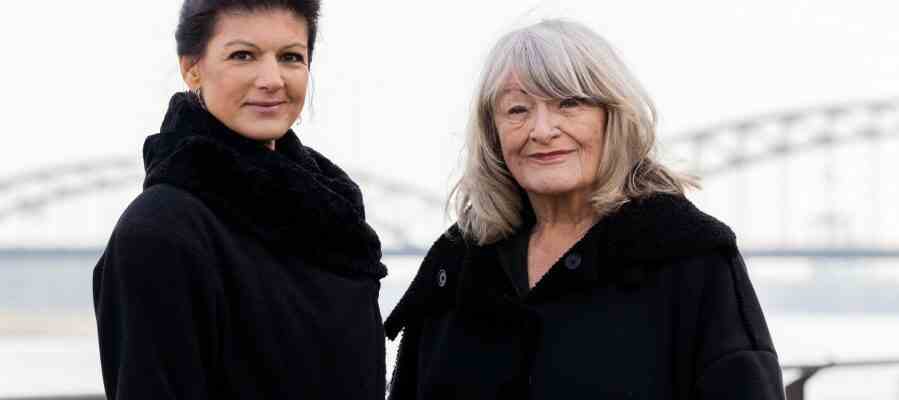Maybe fifty people gathered on the median Unter Den Linden on Friday afternoon. In front of them is the mighty building of the Russian embassy, to their left a battered tank of the country’s army; Activists brought it to mark the anniversary of the invasion of Ukraine. The anniversary is also the reason why the Berlin left is holding a vigil there. “Supporting Ukraine’s right to self-defense is deeply left-wing politics,” says Senator for Culture Klaus Lederer, adding: “Anyone who doesn’t say all this shouldn’t be surprised at the applause from the right.”
The Russian aggressors are not the only addressees of his speech. The other is Sahra Wagenknecht, the party’s member of parliament. Together with the feminist Alice Schwarzer, she has called for a rally at the Brandenburg Gate at 2 p.m. this Saturday. Already on February 10, the two popular and controversial women had a “Manifesto for Peace” put to the vote online. Half a million people signed it within just over a week, and on Friday afternoon there were 625,000 signatures.
Right-wing extremists try to hijack the manifesto and the call for themselves
In it, Wagenknecht and Schwarzer call for an immediate ceasefire in Ukraine and for peace negotiations. An appeal that has been heavily criticized. Among other things, because it negates the Ukrainians’ right to self-defense. But above all because of the list of supporters of the manifesto. A number of well-known artists, scientists and liberal politicians were among the first to sign. At the same time, right-wing extremists are trying to hijack the manifesto and the call for themselves. Not only AfD co-boss Tino Chrupalla claims to have signed the appeal.
The former chairwoman of the council of the Evangelical Church, Margot Käßmann, and the spokesman for the German Peace Society, Jürgen Grässlin, signed the manifesto. From the rally they got themselves in a joint statement but distanced themselves. The demarcation of the initiators from the support from the far right is too vague. “Anyone who would like to demonstrate with us for peace with an honest heart is welcome,” Wagenknecht replied to this criticism. On Saturday, however, the folders would prevent right-wing extremists from showing flags and other insignia at the rally. In the meantime, the AfD leadership said on request that they would not take part in the demonstration.
With the call, Wagenknecht got the left in trouble. The party leadership had previously distanced itself from the manifesto. Jan Korte, Parliamentary Secretary of the Left Group in the Bundestag, also said on Friday that he would not be present at the demonstration. “The way it was organized, let’s put it that way, I would have done it differently.” In the manifesto itself, however, “a lot of things are right”. In all internal disputes – in the left there is no deviation from the position that a European peace initiative is necessary and no further deliveries of heavy weapons, said Korte. But the term “diplomacy” has “meanwhile become a swear word” in the Bundestag.
Thilo Bode also believes that there is too little talk about negotiations, and all the more “about victory and defeat”. Bode, former head of Greenpeace and Foodwatch, was one of the first to sign the manifesto and wants to stick to it. “The concerns are clear to me, I didn’t sign it light-heartedly either.” He knows the situation of getting applause from the wrong side. For example, in the actions against the TTIP free trade agreement, which were also supported by some ultra-right. “But the public appearance for peace and negotiations outweighs my reservations,” says Bode about his commitment. “You have to put your head down sometimes.”
Editor’s note: An earlier version of this text stated that Margot Käßmann and Jürgen Grässlin had withdrawn their support for the “Manifesto for Peace”. In a joint statement, however, both only distanced themselves from the rally in Berlin. We have corrected this passage.

